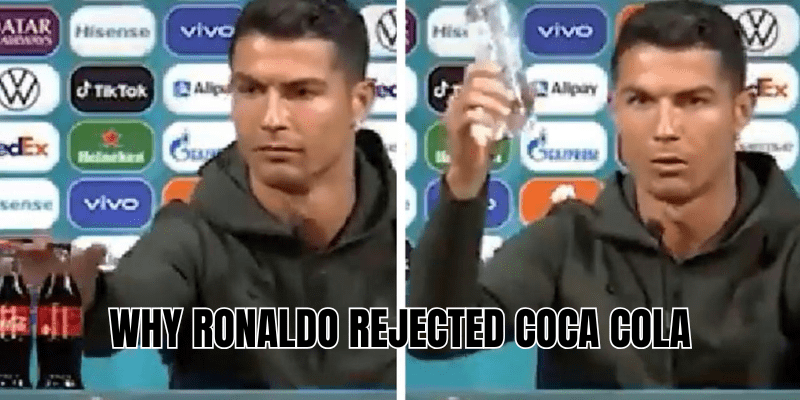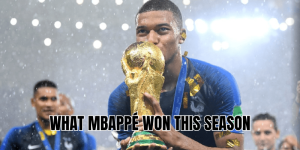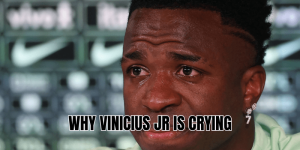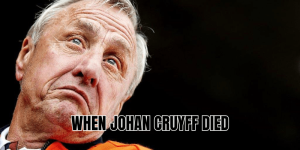Cristiano Ronaldo’s move to push aside two bottles of Coca-Cola and pick up a bottle of water at a Euro 2020 press conference shocked fans around the world—and stirred a lot of debate. But why Ronaldo rejected Coca Cola wasn’t just about a fizzy drink; it was a confluence of his personal values, branding power, media impact, and big business. Below, BraeckBall will accompany you to explore what really happened, what Ronaldo’s motivations likely were, and what the ripple effects turned out to be.
What happened: the press conference moment
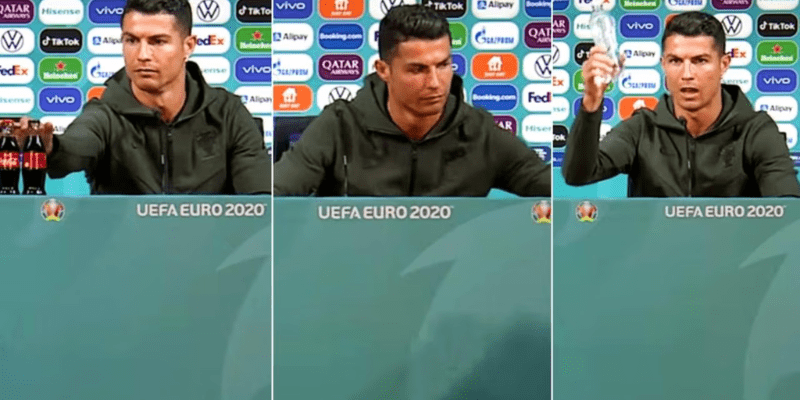
On June 14, 2021, ahead of Portugal’s Group F match against Hungary at Euro 2020, Ronaldo walked into a press conference where two bottles of Coca-Cola had been placed in front of him. He visibly moved them aside, held up a bottle of water, and said “Agua!” (Portuguese for “water”). He encouraged people to drink water, implicitly rejecting Coca-Cola’s product.
Instantly, the media picked up on it. Within hours, Coca-Cola’s share price dropped by around 1.6%, which corresponded to a market valuation loss of about US$4 billion. Many outlets tied that drop directly to Ronaldo’s gesture.
Possible reasons behind Ronaldo’s rejection
There are a few layers to ** Ronaldo rejected Coca Cola**—not just a single cause.
1. Health, fitness, and personal diet
Ronaldo has long maintained that his body is his temple. His diet, workout, recovery, and rest are finely tuned. Sugary sodas (including Coca-Cola) don’t align with that strictly controlled routine. Choosing water over soda is consistent with his image, lifestyle, and what he expects.
2. Brand image and being a role model
As one of the most followed athletes globally, Ronaldo knows many eyes are on him. Rejecting a product often becomes a statement. By choosing water, he signals that sometimes even big sponsors aren’t aligned with a person’s principles or health. That enhances his credibility among fans who admire clean living, discipline, and authenticity.
3. Visibility, symbolism, and influence
In an age where gestures carry more weight than words on social media, Ronaldo’s act wasn’t just about not drinking Coke—it was about rejecting what Coke represents in that moment: mass consumer culture, sugary drinks, and the mismatch between high-intensity performance and unhealthy options. The symbolism of moving the Coke bottlesin front of cameras made a stronger statement than a simple verbal refusal.
4. Publicity and cultural pressure
There may also have been an element of pressure. Ronaldo’s image has built on consistent discipline, and rejecting a sugary beverage in such a public, theatrical way reinforces that. Also, some reporting suggested Ronaldo had been critical of soft drinks in his family life (for instance, being irritated when his son drinks soda) which suggests he doesn’t take the matter lightly.
How big was the impact – and was it really all Ronaldo?
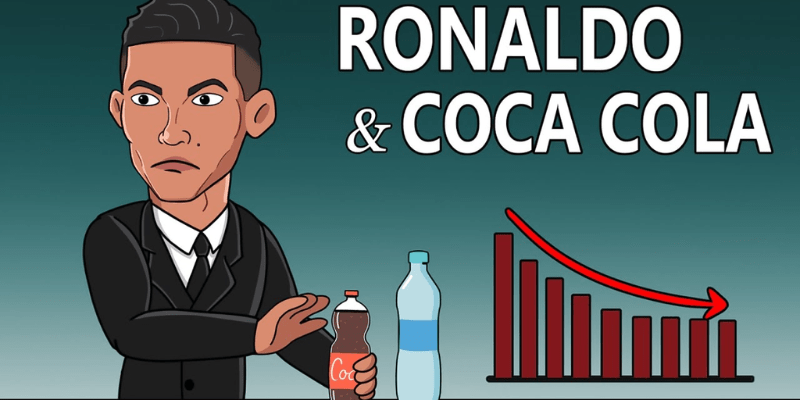
The popular narrative quickly became: Ronaldo rejected Coca-Cola → Coke lost US$4 billion. But the truth has more nuance.
- Timing matters. The share price drop of about 1.6% (from ~$56.10 to ~$55.22) did occur, and it aligned nearly with Ronaldo’s gesture.
- Other factors also in play. Analysts note that some decline had begun before Ronaldo removed the bottles. Also, Coca-Cola shares were going ex-dividend around that time—when a stock is trading ex-dividend, its price typically drops because new buyers no longer receive the upcoming dividend. That tends to weaken attributions that a single action caused all the effect.
- Reaction vs causation. While Ronaldo’s gesture got global media attention, attributing millions (or billions) lost in market capitalization solely to that moment is contestable. The stock reopened loweryes—but markets move for many reasons. Some reports stress that after Ronaldo made his gesture, the stock partially recovered over the rest of the trading day.
So, why Ronaldo rejected Coca Cola had a measurable impact—symbolic, reputational, and perhaps financial—but it’s unlikely the sole driver of the stock movement.
What we learned: implications for brands, sport, and fans
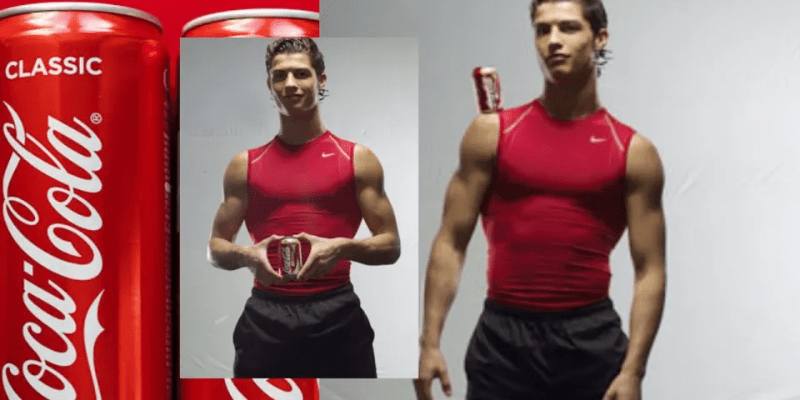
This incident isn’t just a quirky footnote—it points to bigger shifts in how football, sponsors, and athletes interact.
- Athletes have power over sponsorship narratives. Ronaldo’s action showed that stars are not just passive arms for brands—they can actively reshape how fans perceive sponsorships. If a sponsor doesn’t align with an athlete’s values (health, performance, image), it can backfire.
- Branding is fragile in the social media age. A simple moment, widely shared, can affect public perception and even financial metrics. Brands must anticipate that their sponsored presence in high-visibility events may be critiqued or rejected by the talent or audience.
- Fans increasingly expect authenticity. Viewers want athletes who live what they preach. Choosing water over soda during a major press conference is a small thing—but for many, it reinforces trust: that Ronaldo practices what he preaches.
- Sponsorships under scrutiny. Official sponsors (like Coca-Cola at Euro 2020) still hold huge reach. But if those sponsors’ products clash with health expectations, we may see shifts: different products on display, more “opt-ins” for athletes to choose, or more conflict over product placement.
Common misconceptions
To keep things clear, here are a few myths and what the evidence says:
Myth: Ronaldo hates Coca-Cola.
Reality: He didn’t verbally attack the brand; he rejected drinking it for health reasons and promoted water instead.
Myth: Coca-Cola’s market crashed because of Ronaldo.
Reality: The market dip coincided with his gesture, but other technicalities (like ex-dividend timing) also explain much of the drop. It wasn’t purely cause-and-effect.
Myth: This changed Ronaldo’s sponsorship deals or contractual obligations.
Reality: There’s no public record that his existing deals were violated or that this move triggered legal disputes. It was a personal gesture in a public forum.
Conclusion
Why Ronaldo rejected Coca Cola boils down to a mix of health values, branding, authenticity, and influence. He chose water over a sugary soda during a high-profile moment, making a symbolic statement that resonated across millions of fans and media outlets. The gesture caused a noticeable market reaction—but attributing the full financial fallout solely to that act is simplistic.
If you want to dive deeper into Ronaldo’s fitness regime, his other stances about diet, or how athlete activism is changing modern sports sponsorships, BraeckBall has more articles coming up. Share this with friends who love the drama off the pitch, and tell us: what do you think—was Ronaldo’s gesture justified, or just media sensationalism?
